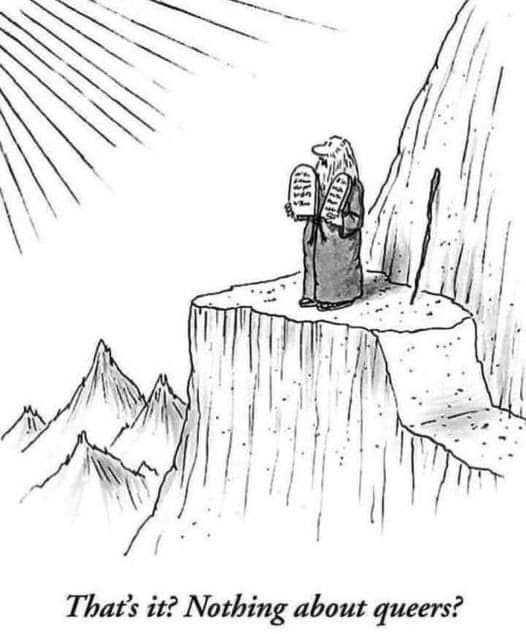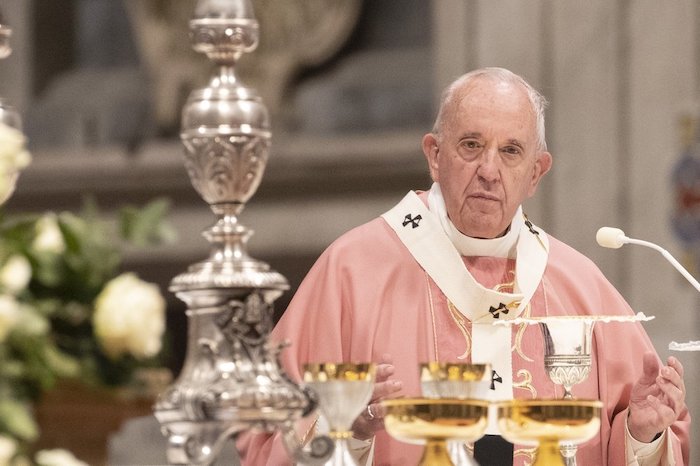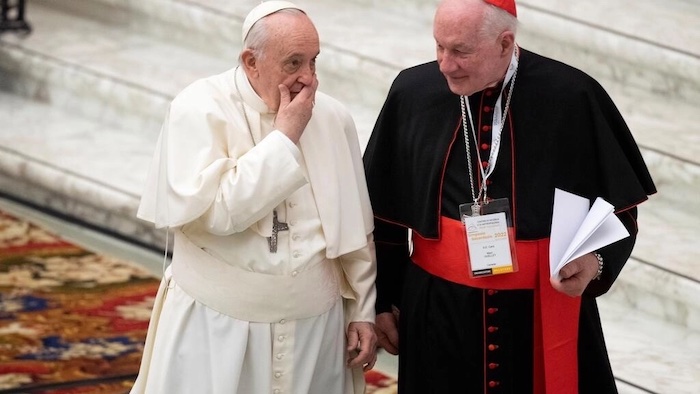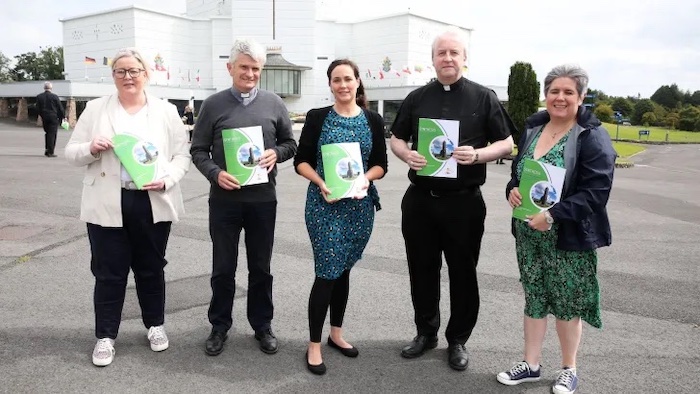
The meaning behind Pope Francis’ meeting with transgender people

By: Newsy
Father James Martin has taken his message of prayer and inclusivity everywhere, from “The Late Show with Stephen Colbert” to the halls of the Vatican. In May, he wrote to Pope Francis with a few questions.
“I just wanted to give him a time to briefly talk to LGBTQ Catholics,” Martin said.
Francis has extended apologies to the abused and a welcome to the historically rejected. According to the Vatican News, he recently met with transgender people near Rome, Italy.
So Martin’s questions aren’t so random.
“I asked him, ‘What would you most like them to know about the church?'” Martin said. “He said, ‘Read Acts of the Apostles,’ which was really interesting because there’s a church that’s kind of mixing it up. Then also, ‘What would you say to an LGBTQ Catholic who felt rejected by the church?’ And he said very interestingly to remember that it’s not the church that rejects you, the church loves you, but it might be individual people in the church.”
It isn’t the first time Francis has corresponded directly with Martin on LGBTQ relations or the first time he has spoken up about their place within the Catholic church.
In 2016, Francis agreed the church should apologize to not only gay people but other marginalized groups, like the poor. He’s also called for parents to accept their LGBTQ children.
Francis’ gestures are one thing; changing church doctrine, which teaches that the act of homosexuality is sinful, is another.
“What would have happened really, in a sense, is for theologians working together, along with church officials, to come to some newer understanding of how they can accommodate for older church teaching on these issues, to show that the church evolves rather than dramatically changing,” said Michele Dillon, professor of sociology at the University of New Hampshire. “Because the church is not going to say, ‘Oh, we were wrong.’ It’s very rare.”
“If he were to do that, which I don’t think Pope Francis will, but if he were to do that, he would not want to do it without support from the Curia and the College of Cardinals,” said Cristina Traina, professor of Catholic theology at Fordham University. “He would not want to do it without tracing a pathway theologically.”
Instead, Francis has gone another direction: one met with both criticism and praise, uplifting LGBTQ Catholics while simultaneously reiterating church doctrine.
NEWSY’S AMBER STRONG: Is he sort of riding the line between saying that this is doctrine and doctrines not going to change? But, we also still need to love and affirm people as well.
FATHER JAMES MARTIN: I think that’s a good question, and I think he is kind of trying to straddle that line. But I think one thing to remember is that what seems very bland and tepid in the United States — overseas is a big deal. In the U.S., we might say, ‘Oh, big deal. Of course, you should welcome your kids.’ If you’re in Eastern Europe or sub-Saharan Africa or Latin America or India, that’s a big deal. So, we have to remember that he’s speaking to the whole church.”
According to Pew Research, 76% of U.S. Catholics say society should be accepting of homosexuality. That’s below the rate of Catholic support in countries like Spain and the Netherlands but far higher than places like Lebanon and Nigeria.
Some theologians argue that Francis’ support could have a trickle-down impact on individual Catholics and parishes.
“These things can do a lot to encourage Catholics to embrace LGBTQ people with love and compassion and mercy and not to see them as the Antichrist, the anathema, the enemy of salvation,” Traina said.
In 2021, a group of Catholic leaders, including a cardinal and archbishop, signed a statement calling for widespread support of at-risk LGBTQ youth. According to an NCR analysis of recent listening sessions among U.S. Catholics, there was a growing call for LGBTQ inclusion and more opportunities for women.
“To me, there’s no such thing as an empty gesture because, yes, many times people want to see more clear-cut evidence of change and of their acceptance within the church, but sometimes it’s in small steps,” Dillon said.
In 2021, Martin, a Vatican appointee under Francis, launched Outreach: a website that provides resources to LGBTQ Catholics and leaders. It’s an effort Pope Francis has encouraged.
“He hasn’t changed any church teaching,” Martin said. “I’m not advocating for any church teaching, but he’s advocated a more pastoral response, listening to them, welcoming them, treating them with respect.
Complete Article ↪HERE↩!
Pope removes shroud of secrecy from clergy sex abuse cases

By NICOLE WINFIELD
Pope Francis abolished the use of the Vatican’s highest level of secrecy in clergy sexual abuse cases Tuesday, responding to mounting criticism that the rule of “pontifical secrecy” has been used to protect pedophiles, silence victims and prevent police from investigating crimes.
Victims and their advocates cheered the move as long overdue, but cautioned that the proof of its effectiveness would come when the Catholic hierarchy is forced to respond to national inquiries, grand jury subpoenas and criminal prosecutors who are increasingly demanding all internal documentation about abusers.
“The carnival of obscurity is over,” declared Juan Carlos Cruz, a prominent Chilean survivor of clergy abuse and advocate for victims.
In a new law, Francis decreed that information in abuse cases must be protected by church leaders to ensure its “security, integrity and confidentiality.” But he said the rule of “pontifical secrecy” no longer applied to abuse-related accusations, trials and decisions under the Catholic Church’s canon law.
The Vatican’s leading sex crimes investigator, Archbishop Charles Scicluna, said the reform was an “epochal decision” that will facilitate coordination with civil law enforcement and open up lines of communication with victims.
While documentation from the church’s in-house legal proceedings will still not become public, Scicluna said, the reform now removes any excuse to not cooperate with legitimate legal requests from prosecutors, police or other civil authorities.
Francis also raised from 14 to 18 the cutoff age below which the Vatican considers pornographic images to be child pornography. The reform is a response to the Vatican’s increasing awareness of the prolific spread of online child porn that has frequently implicated even high-ranking churchmen.
The new laws were issued Tuesday, Francis’ 83rd birthday, as he struggles to respond to the global explosion of the abuse scandal, his own missteps and demands for greater transparency and accountability from victims, law enforcement and ordinary Catholics alike.
“The reforms are long overdue but symbolize an important step in the right direction,” said SNAP, the victims advocacy group. “Still right now they are only words on paper and what needs to happen next is concrete action.”
The new norms are the latest amendment to the Catholic Church’s in-house canon law — a parallel legal code that metes out ecclesial justice for crimes against the faith — in this case relating to the sexual abuse of minors or vulnerable people by priests, bishops or cardinals. In this legal system, the worst punishment a priest can incur is being defrocked, or dismissed from the clerical state.
When he was a cardinal, Pope Benedict XVI had persuaded St. John Paul II to decree in 2001 that these cases must be handled by the Vatican’s Congregation for the Doctrine of the Faith and be dealt with under the “pontifical secret” rule. The Vatican had long insisted that such confidentiality was necessary to protect the privacy of the victim, the reputation of the accused and the integrity of the canonical process.
However, such secrecy also served to keep the scandal hidden, prevent law enforcement from accessing documents and silence victims, many of whom often believed that the “pontifical secret” rule prevented them from going to the police to report their priestly abusers.
While the Vatican has long tried to insist this was not the case, it also never mandated that bishops and religious superiors report sex crimes to police, and in the past it has also encouraged bishops not to do so.
According to the new instruction, which was signed by the Vatican secretary of state but authorized by the pope, the Vatican still doesn’t mandate reporting the crimes to police, saying religious superiors are obliged to do so where civil reporting laws require it.
But it goes further than the Vatican has gone before, saying: “Office confidentiality shall not prevent the fulfillment of the obligations laid down in all places by civil laws, including any reporting obligations, and the execution of enforceable requests of civil judicial authorities.”
The Vatican has been under increasing pressure to cooperate more with law enforcement, and its failure to do so has resulted in unprecedented raids in recent years on diocesan chanceries by police from Belgium to Texas and Chile.
But even under the threat of subpoenas and raids, bishops have sometimes felt compelled to withhold canonical proceedings given the “pontifical secret” rule, unless given permission to hand documents over by the Vatican. The new law makes that explicit permission no longer required.
“The freedom of information to statutory authorities and to victims is something that is being facilitated by this new law,” Scicluna told Vatican media.
Robert Hoatson, a survivor and founder of the clergy abuse advocacy group Road to Recovery, said the change was long overdue and a “hopeful sign that the church will finally hold itself accountable for the centuries-old scandal.”
The Vatican in May issued another law explicitly saying victims cannot be silenced and have a right to learn the outcome of their canonical trials. The new document repeats that and expands the point by saying not only the victim, but any witnesses or the person who lodged the accusation cannot be compelled to silence.
“Excellent news,” tweeted prominent Irish survivor Marie Collins, a founding member of Francis’ sex abuse advisory commission who noted that the reform was one of the first proposals of the commission.
“At last a real and positive change,” she wrote.
Lawyers for victims and accused priests have also advocated for a change to the pontifical secret rule, since it restricted their access to documentation from the case. Scicluna said the reform now facilitates making documents available to “interested parties” in a penal case, although it is not clear if these lawyers will still only be able to view the documents — as is currently the case — or can now make and keep copies of them, under the understanding that they remain confidential.
In recent years, individual abuse scandals, national inquiries, grand jury investigations, U.N. denunciations and increasingly costly civil litigation have devastated the Catholic hierarchy’s credibility across the globe, and Francis’ own failures and missteps in dealing with particular cases have emboldened his critics.
In February, he summoned the presidents of bishops’ conferences from around the globe to a four-day summit on preventing abuse, where several speakers called for a reform of the pontifical secrecy rule. Francis himself said he intended to raise the age for which pornography was considered child porn.
The move is significant and an indication that Francis has learned a lesson after one of his Argentine proteges, Bishop Gustavo Zanchetta, was accused of inappropriate conduct with seminarians after gay porn — said to involve youngsters but not boys — was found on his cellphone.
“To date, the church has been especially lenient towards priests who offend against older children” with pornography, said Anne Barrett Doyle of the online resource BishopAccountability. “Extending the pornography ban sends a message that this vulnerable group of minors must be protected too.”
The Vatican’s editorial director, Andrea Tornielli, said the new law is a “historical” follow-up to the February summit and a sign of openness and transparency.
“The breadth of Pope Francis’ decision is evident: The well-being of children and young people must always come before any protection of a secret, even the ‘’pontifical secret,’” he said in a statement.
Also Tuesday, Francis accepted the resignation of the Vatican’s ambassador to France, Archbishop Luigi Ventura, who is accused of making unwanted sexual advances to young men.
Ventura turned 75 last week, the mandatory retirement age for bishops, but the fact that his resignation was announced on the same day as Francis’ abuse reforms didn’t seem to be a coincidence.
Complete Article ↪HERE↩!
Pope rules out sex assault inquiry into Canada cardinal

Pope Francis has ruled out a formal church investigation into a sexual assault claim against Canadian Cardinal Marc Ouellet after a preliminary inquiry found no basis for one, the Vatican said Thursday.
Ouellet, himself once considered a strong candidate to be pope, was named in court documents this week relating to a class action suit targeting more than 80 members of the clergy in the archdiocese of Quebec.
The 78-year-old is accused of abusing a female intern, identified only as “F”, from 2008 to 2010, when he was archbishop of Quebec.
In the Vatican’s first public response to the civil suit, spokesman Matteo Bruni said a “preliminary investigation” already ordered by Pope Francis had found there were “no elements to initiate a trial”.
He said the pontiff again consulted the author of that probe, a Father Jacques Servais, and was told again that there were no grounds for opening a formal investigation.
“Following further relevant consultations, Pope Francis declares that there are insufficient elements to open a canonical investigation for sexual assault by Cardinal Ouellet against person F,” the statement said.
‘Chased after’
Ouellet is a prefect of the Congregation for Bishops, one of the most important functions within the Curia, the government of the Vatican.
The claims against him in the civil suit, which the Quebec supreme court ruled could go ahead in May, are among the testimonies of 101 people who say they were sexually assaulted by members of the clergy and church staff from 1940 to today.
They emerged just weeks after Pope Francis visited Canada, where he apologised for the decades-long abuse of Indigenous children in Catholic-run residential schools.
So far, the cardinal is not facing criminal charges.
Ouellet’s accuser claims the cardinal assaulted her multiple times — kissing her, “forcefully” massaging her shoulders, and once sliding his hand along her back to her buttocks.
She says she had the feeling of being “chased after”, according to the documents. When the woman tried to raise the issue, she was told she was not the only woman to have such a “problem” with Ouellet, documents show.
It was not until 2020 that F., who says she was also sexually abused by another cleric, spoke to the Quebec church’s sex abuse advisory committee.
It recommended she write to the pope, who in 2021 responded by nominating Servais to look into the case. She had not yet been told of his conclusions.
According to Thursday’s Vatican statement, Servais said he had interviewed the woman via Zoom in the presence of a member of the committee.
He was quoted as saying that neither in her report to the pope, nor in the testimony he heard, “did this person make an accusation that would provide material for such an investigation”.
In February, Ouellet opened a Vatican symposium on the priesthood by apologising for “unworthy” clergy and the cover-up of child sexual abuse by Catholic clergy, before an audience that included Pope Francis.
“We are all torn and humbled by these crucial questions that every day question us as members of the Church,” Ouellet said at the time.
He said the symposium was an opportunity to express regret and ask victims for forgiveness, after their lives were “destroyed by abusive and criminal behaviour” that was hidden or treated lightly to protect the institution and the perpetrators.
Since becoming pope in 2013, Francis has sought to tackle the decades-long sexual abuse scandals, although many activists against paedophilia insist much more needs to be done.
Complete Article ↪HERE↩!
Synod report sees disconnect between many Catholics and Church teaching, calls for more accountability

By
Catholics want greater transparency, participation in decision-making and accountability within parish and diocesan structures, Archbishop Eamon Martin of Armagh has said.
Publishing the synodal synthesis document this afternoon (Thursday) – which was this week forwarded to the Holy See – the Primate of All-Ireland acknowledged that the report reflects the challenges of “a major decline in the practice of the faith, and in vocations to priesthood and religious life”.
“This problem can only be addressed with the deployment of significant resources into programmes for those who wish to deepen their own faith, spirituality and understanding of scripture at a personal or academic level,” the report says.
The synthesis, which is the fruit of the participation of tens of thousands of Catholics across all 26 dioceses, says that: “many young people cannot understand the Church’s position on women”.
“Because of the disconnect between the Church’s view of women and the role of women in wider society today, the Church is perceived as patriarchal and by some, as misogynistic,” it says.
“There was a clear, overwhelming call for the full inclusion of LGBTQI+ people in the Church, expressed by all ages and particularly by the young and by members of the LGBTQI+ community themselves.
“Some called for a change in Church teaching, asking if the Church is sufficiently mindful of developments with regard to human sexuality and the lived reality of LGBTQI+ couples,” the document notes.
A focus group of LGBTQI+ Catholics who participated in the synodal pathway said that the Church should apologise to that group. “This submission suggested that even though the Church rarely condemns gay people these days, it indirectly creates an atmosphere where physical, psychological and emotional abuse of gay people is tolerated and even encouraged”.
Many people who participated in the synod said they felt ill-equipped to articulate their faith in a secular environment.
“Our spiritual growth is stunted. As adult members of the Church, we are not sufficiently grounded in our faith, and do not have the confidence in speaking about our love of God,” one participant was quoted as saying.
“The synodal process highlighted the serious weaknesses in adult faith development in Ireland. Many of the submissions reported that people found it hard to engage with the questions, the concepts and the language relating to communion and mission,” the report said.
It says: “there is a felt need among many respondents for safe and dynamic spaces where people can come together to talk deeply about their faith and increase their knowledge of it.
“This problem can only be addressed with the deployment of significant resources into programmes for those who wish to deepen their own faith, spirituality and understanding of scripture at a personal or academic level.
“Some felt that if we invested half as many resources into the training and formation of people as we do into buildings, we could dramatically improve the life of the Church in Ireland today,” the synthesis asserts.
“The question also emerges whether many Irish Catholics are ‘sacramentalised but not evangelised’,” the report asks.
The role of women was a persistent theme in the discussions at parish and diocesan level. “Several of the submissions called for the ordination of women to the permanent diaconate and the priesthood. Their exclusion from the diaconate is regarded as particularly hurtful,” according to the synthesis.
But, some parishioners sounded a note of caution. “Others expressed a concern that a change in the Church’s teaching would be simply conforming to secular standards and contemporary culture.
“There are other minority, yet strong, voices that believe the Church, rooted in the Catholic Tradition, should not conform to secular standards when it comes to questions regarding gender, sexuality, and relationships. For others, the Church has no credibility in modern society as long as discrimination on the grounds of gender or sexuality exists,” the document says.
The issue of youth and the question of how the Church might engage with them, emerged universally across the synodal process.
“Multiple dioceses and organisations noted the absence of young people in parish communities and many submissions articulated a view that other youth organisations provide a home for young people that is more welcoming than that in parishes.
“There was an openness and honesty in responses from young people. They identified with faith and with the Gospel message and what we are called to as Church. One response clearly conveyed the sentiments expressed by so many: the one thing we, as young people, look for is sincerity. In many instances it was felt that the Church lacked this, or indeed pastoral awareness of the significant challenges faced by young people today. One notable example given was the mental health crisis faced by many young people,” it says.
However, amongst younger Catholics there were also divergent views on the approach the Church should take. “Many young people were critical of the Church regarding the role of women, clerical celibacy and its handling of the abuse crisis. A significant number disagreed with the Church’s teaching on sexuality and the Church’s position on sex was considered as a barrier to participation by some young people.
“On the other hand, some young people said that, for them, the Church’s teaching on sexuality is a welcome challenge,” it says articulating the opposing view.
Most participants appeared to have enjoyed the opportunity to be heard. “Those engaged in the synodal process called for unity in diversity, which does not entail a bland uniformity or avoidance of conflict but an ability to ‘endure conflict’
“Let us keep talking and the Holy Spirit will reveal the path,” one participant quoted in the report said.
Organisers noted that “There is a challenge to sustain the encounter and the participative nature of synodality, grounded in respectful listening, for long enough to arrive at the point where specific decisions are discerned to be necessary, given the risk that such decision points are inevitably difficult for those of a contrary disposition,” according to the document.
Dr Nicola Brady, chair of the synod steering committee insisted that: “Important questions have been set out for deeper reflection and pastoral action at every level of Church life and there will be many more opportunities for people to get involved and help shape this process”.
In a letter accompanying the 27-page report to Cardinal Mario Grech, Secretary General of the Synod of Bishops General Secretariat, Archbishop Martin noted that “since October 2021, tens of thousands of Catholics across Ireland have been engaging in prayerful listening and reflection on the theme chosen by Pope Francis: ‘For a Synodal Church: Communion, Participation, Mission.’
“In a prayerful atmosphere, we heard feedback from the hundreds of conversations that had taken place across Ireland, and from the many submissions that had been collected. Like the disciples on the road to Emmaus listening to Jesus, we too experienced our hearts burning within us as we gathered in his name,” he said.
Complete Article ↪HERE↩!
